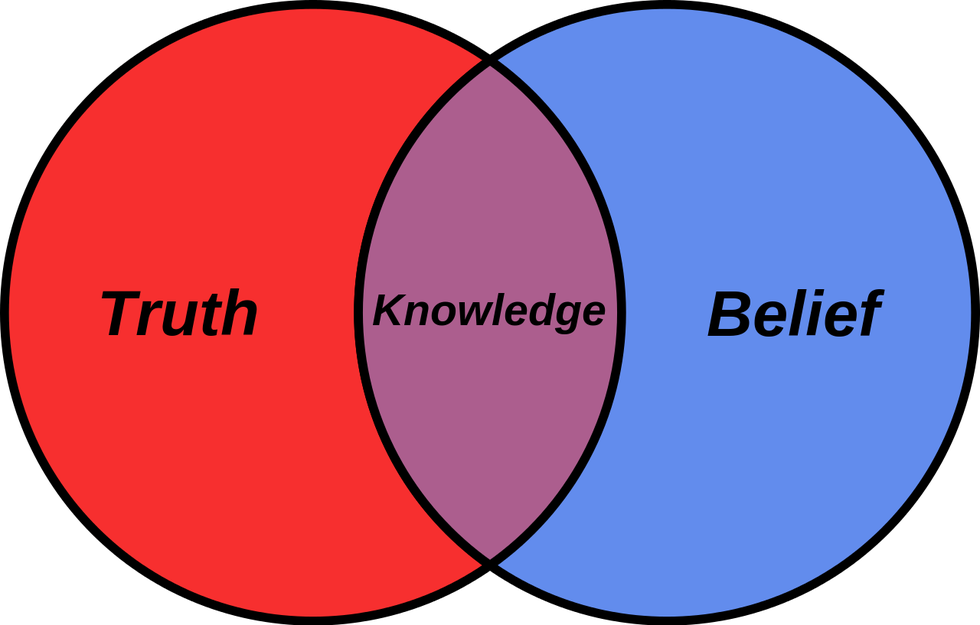“Whenever the people are well-informed, they can be trusted with their own government”
~Thomas Jefferson,1789
This last week I have had the privilege to work with and listen to the prominent Street Epistemologist Anthony Magnabosco. For those of you who understandably don't know what Street Epistemology is, it is defined by streetepistemology.com as "a method and an approach for having meaningful, civil, non-confrontational, respectful, and productive conversations that are orientated toward aligning our beliefs with reality." Epistemology is the study of knowledge. So to practice Street Epistemology is to discuss how one comes to knowledge out in public.
There could not be a more important movement on the rise than that of Street Epistemology. What people hold to be true is the basis for every single decision that they make in their lives. If people believe things that aren't true then there can be serious consequences such as infringements on human rights, mass genocide, dismissals of scientific facts such as global warming and evolution, and many other things that affect humans, animals, and the environment. There are many other smaller and more benign beliefs that can have small negative impacts on people that don't go to the extremes of those previously listed.
How people come to know that things are true is vitally important. Even small harmless beliefs such as "I always pick the slowest line in the supermarket" can contribute to a certain way that people think. Street Epistemology takes a claim like that an allows for a friendly examination of it to see how it came to be believed. Of course, as Anthony points out, some people are simply being conversational and don't truly believe it.
To being an examination in a friendly manner, Anthony gives some very basic do's and don'ts. For example, he listed a few bad responses to someone claiming that they pick the slowest line:
Disagreement:
"That's unlikely"
"That is the dumbest thing I've ever heard"
False Agreement:
"Yeah"
"I feel you"
If you don't believe the claim yourself, then it isn't worth agreeing to it. It will give potentially false ideas in our society credence. Instead of idly agreeing, you can instead use this opportunity to help them examine their belief. Anthony says that you could instead ask politely how they came to that conclusion with some of these responses:
"That's interesting. How did you come to that conclusion?"
"Whoa, that's some talent. How did you figure that out?"
"Hmm. How did you come to that determination?"
This kind of response opens up the conversation into many new directions while being polite, conversational, and engaging. You never know, you might even walk out of that line with a new acquaintance.
The goal of the conversation is to come to a better understanding of the belief, how that person came to it, and to place a pebble in the shoe of that person about the validity of that belief. Street Epistemology doesn't aim to change peoples' beliefs in a quick couple minute conversation, instead it aims to encourage that person to become open to the possibility that their belief is wrong and to further investigate the belief. Inspiring that doubt will encourage them to look deeper into their belief and why they believe it. That research will do one of two things. It will either dissuade them of that belief, or cause them to have stronger and more valid reasons for believing that belief. Either way they will come closer to knowing the truth of that claim.
Coming back to the belief "I always pick the slowest line in the supermarket." Some ways that the examination can go is to ask how they came to that belief. They may respond that they watch another line and that other line always moves fast. You could ask if they sometimes don't pay attention to the line speeds and perhaps one of those times their line moved faster. Or you could ask if they truly kept an eye on every line that was moving. Perhaps the other line they chose for reference was faster but the line two spots down actually moved faster.
The key to any discussion where you are using Street Epistemology is that you should ask questions way way way more than you should give answers. Your goal isn't to tell them what it true, it is to ask them if it is. In this way you both come to a better understanding of each other and of the belief in question.
Resources
This is a small taste of the rich and complex art of Street Epistemology. There are many things to learn such as active listening, modeling behavior, and other sociological and psychological effects and nuances. With any art it takes a lot of practice and help. Thankfully there are many many resources out there. I have provided a list below:
- A Manual For Creating Atheist by Peter Boghossian
- The Official Street Epistemology Website
- The Complete Guide To Street Epistemology
- The Atheos App (on android and iOS)


























